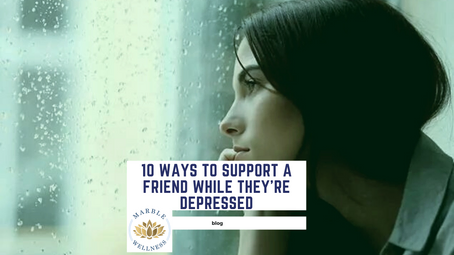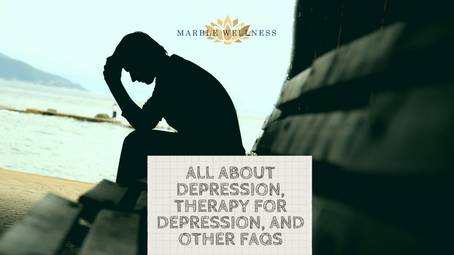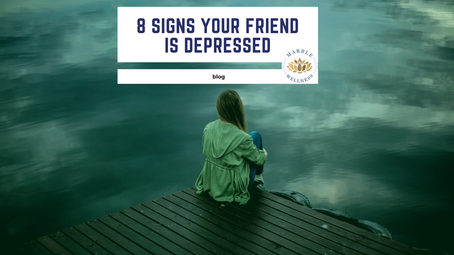
What is Depression?
Depression is a sneaky bugger. It’s often made itself at home before it’s noticed. And as an outsider watching a friend, coworker, or family member try to deal with it-well, that can also be really tough.
To learn more about Depression from the Mayo Clinic, Click Here!
Last week, I wrote a blog post about signs your friend may be depressed. If you missed it or want to read it, go ahead and click here — it’s a quick read and I hope is really helpful!
But, back to today’s topic: what to do when you’ve noticed the signs and realize, “oh yes, this applies.”
First and foremost, consider your relationship with this person. Use that to help guide your decisions about how to apply any of the following tips on how to support a friend through depression.
Here are tips on how to support a depressed friend from a St. Louis, MO Therapist:
1. Namely, be gentle.
This person is suffering through a very dark time period and is confused herself. She’s tired and worn out easily.
2. If your friend isn’t going out much anymore, ask about doing something low-key, just the two of you (or with a small group).
She likely would appreciate some socializing, but loud environments with a lot of people is stimulus overload. A night in on the couch is a great way to accomplish this.

3. Let her know it’s okay if she cancels.
Leave it open-ended. But also push maybe just a little bit-suggest both of you being in sweats, or you just swinging by for 30 minutes (if that’s feasible for you).
4. Just send a check-in text.
“Hi! Been thinking about you. Hope you have a good day!” or anything of the sort. Maybe don’t include a question so your friend doesn’t feel disappointed in her inability to answer. (Inability stemming from exhausting + not wanting to tell you how bad a day it is.)
5. If you’re close enough, open a conversation about therapy and/or talking to their doctor.
Depression is treatable but there is still SUCH a stigma about “fixing it alone” or “suffering through it.” Sometimes people need a little push to reach out to a professional. If it’s a hard conversation to have face-to-face, send them an email so they don’t have to respond to you in the moment.
6. Perform a random act-of-kindness.
See #4 for the easiest example.
7. Invite them to get out of the house in a different way than usual.
Suggestions include checking in to see if they want to go for a walk, or maybe go for a drive, run some errands with you, or low-key and low-expectation events like that. Again, allow an easy cancel.

8. Encourage others in your circle to follow these same supportive actions.
You may recognize the depression and others in your friends’ group don’t. But cluing them in, so your suffering friend has even more support, can be so helpful!
9. During their healing process (when you’ve started to notice them strengthening and returning to their previous way of interacting), don’t forget to check in still.
A few good days in a row, or even a few good WEEKS in a row, doesn’t mean there aren’t still REALLY hard days. Which can be scary for someone trying to fight back to regain footing after depression. Knowing they still have people aware of the process can be such a source of strength. And still give them grace on those bad days.
10. Don’t take their behaviors personally (canceling, declining plans, etc).
Your friend is having a hard enough time as it is. She doesn’t mean for anything to be offensive. She’s just trying to get through the day. Being social or responding to a text just isn’t in her wheelhouse right now — she’s prioritizing surviving.
Suffering through depression is hard, and so is supporting someone through it. But you will remain a special person in your friend’s heart for being someone who helped her through such a difficult and scary time. I reiterate that it is not your responsibility to fix the depression. These are just a few ways to lighten someone’s load and help their day have even a moment of reprieve from the negative and dark thoughts and feelings.
And always remember: use the level of your relationship to guide you in implementing the above tips. Be gentle, be kind, and you will be helpful!
Talk to you soon!
Start Therapy in the St. Louis Area
If you live in the St. Louis metro area and are ready to improve your mental health, our expert St. Louis therapists are here to help. Not only do we have a team of therapists in Ballwin, MO, but we have also recently expanded to serve the Lake St. Louis and Wentzville area! Reach out to our Client Care Coordinator today to discuss your therapy options, both in-person and via online therapy in Missouri.
Contact Us!

Additional Counseling Services at Marble Wellness in St. Louis, MO and Chicago, IL
Counseling services designed to help set you on a path of living a more fulfilled, calm, and happy life.
St. Louis
Our St. Louis team of therapists have a variety of training backgrounds and areas of expertise. We specialize in anxiety, depression, grief, chronic illness, therapy for men, couples, and maternal overwhelm. We can also help new moms with various postpartum concerns, moms in the thick of parenting, and moms with teens. We can also chat from wherever you are in the state with online therapy in Missouri and online therapy in Illinois. No matter where you are in your journey, we would love to support you.
Chicago
Our Chicago team of therapists offer a wide range of mental health services to help our clients through the different challenges and hurdles in their life. In addition to anxiety, depression, grief, therapy for men, and maternal overwhelm, we are specialized in professional burnout, therapy for breakups, and love partnering with working moms.



